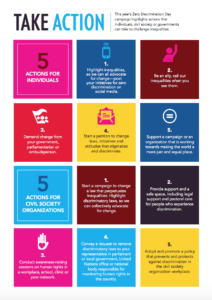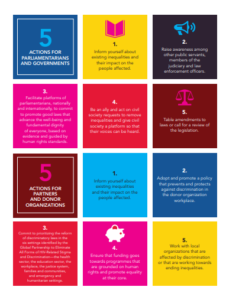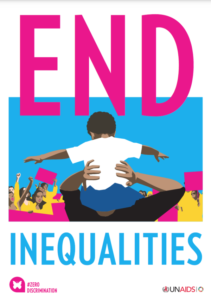Message from the UNAIDS Executive Director on Zero Discrimination Day 2021
This year’s Zero Discrimination Day is an especially poignant one.
It was said at first that viruses don’t discriminate. But as we’ve witnessed again, crises, and societies, do.
COVID-19 has magnified the fissures in society. It has seen marginalized communities, who were already on the edge, taking the hardest economic hit, getting stuck at the back of the line for vital services and getting scapegoated for the crisis.
Yet the crisis has also seen the most excluded communities being, once again, the first to step up to help—rooted in their expertise from experience, in their empathy and in their insistence that health for all and a recovery for all is possible.
UNAIDS joins with communities across the world in demanding equality. We say a resolute no to all inequalities—whether because of gender, income, race, disability, sexual orientation, ethnicity and religion. Such inequalities disfigure society and undermine justice and dignity.
We demand an end to discrimination, stigmatization and criminalization.
We challenge all institutions and all people of influence to not only be non-discriminatory, but to be anti-discrimination.
Discrimination kills. It exacerbates emergencies and it perpetuates pandemics.
The world is off track to end AIDS by 2030 not because of a lack of knowledge, capability or means but because of structural inequalities that stand in the way. For example, research shows that punitive laws regarding sexual orientation double the likelihood of acquiring HIV for gay men and other men who have sex with men. Repealing such laws is central to beating the HIV pandemic.
So too, discrimination against migrants and other excluded and stigmatized populations is obstructing their access to COVID-19 testing, treatment and support. This hurts everybody.

We are seeing the discrimination that scars our countries play out also at the international level. As new vaccines against COVID-19 have become available, there has been gross inequity. Just 10 countries have administered more th
an 75% of all COVID-19 vaccines, while more than 130 countries have not received a single dose. South Africa has called this vaccine apartheid. As the United Nations Secretary-General has said, “Vaccine equity is ultimately about human rights … Vaccine nationalism denies it.” Around the world, and in every country, we must value every person as equally precious.
Ending inequalities will advance the human rights of all, make societies better prepared to beat COVID-19 and future pandemics and support economic recovery and stability.
We need to ensure everyone’s right to health through publicly provided and  financed health care—and provide it respectfully to all, without reservation or judgement.
financed health care—and provide it respectfully to all, without reservation or judgement.
All of us need to call out discrimination wherever we see it, and to work to set an example.
A healthier, safer, more equal and prosperous world depends on it.
I am inspired by the leadership shown by communities facing discrimination. Their determination, courage and vision is our guiding light. The United Nations stands alongside, as a resolute ally for equality.
End inequalities. Demand zero discrimination.
Winnie Byanyima
Executive Director of UNAIDS
Under-Secretary-General of the United Nations
UNAIDS
The Joint United Nations Programme on HIV/AIDS (UNAIDS) leads and inspires the world to achieve its shared vision of zero new HIV infections, zero discrimination and zero AIDS-related deaths. UNAIDS unites the efforts of 11 UN organizations—UNHCR, UNICEF, WFP, UNDP, UNFPA, UNODC, UN Women, ILO, UNESCO, WHO and the World Bank—and works closely with global and national partners towards ending the AIDS epidemic by 2030 as part of the Sustainable Development Goals. Learn more at unaids.org.




